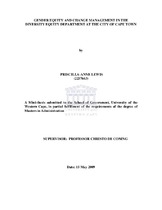| dc.contributor.advisor | de Coning, Christo | |
| dc.contributor.author | Lewis, Priscilla-Anne | |
| dc.contributor.other | | |
| dc.contributor.other | Faculty of Economics and Management Sciences | |
| dc.date.accessioned | 2014-02-04T12:41:57Z | |
| dc.date.available | 2010/06/14 21:52 | |
| dc.date.available | 2010/06/14 | |
| dc.date.available | 2014-02-04T12:41:57Z | |
| dc.date.issued | 2009 | |
| dc.identifier.uri | http://hdl.handle.net/11394/2707 | |
| dc.description | Magister Administrationis - MAdmin | en_US |
| dc.description.abstract | The problem investigated in this study is that gender equity and change management in the City of Cape Town and in particularly the Diversity Equity and Change Management Department, has not been adequately assessed and a coherent set of options to address this problem has not yet been adequately researched. In particular, the situation is that senior management is not representative and that recruitment and appointment procedures as well as the change management process are not conducive to gender equity. The nature of this study is qualitative and the case study method has been utilized. The scope of the study is on gender equity and the change management process followed by management and staff at the City of Cape Town, in particular the Diversity Equity and Change Management Department since 2000 to 2007, with the view of proposing options for improvement. In 2006 the City of Cape Town Employment Statistics indicated that 80% of top management within departments across the City is still white males. At professional and middle management level white males and females dominated this level with 69.5%. In the technical and associate professions, the tally for whites is 38% and at elementary level 6.5% (Department Human Resources HRD IT System, July 2006). In order to equalize employment statistics in the COCT drastic steps should be taken to eliminate imbalances between both Black and white employees in terms of occupational levels. Disadvantaged Black women and men should benefit from employment, recruitment and selection, appointments and training and development processes and the acquisition of knowledge and skills beyond those acquired within the realm of empowerment. However, women should be adequately represented not nearly in the workplace but overall to enable them to participate in the decision-making of important work related and home related issues. Women should keep on addressing inequality and gender equity to enhance change processes and gender awareness amongst themselves and in the workplace. The gender institutional framework within the COCT as a whole in particularly the Diversity Equity department and the active participation in decision-making in the various structures of the City combines with their history of politics in the women's movement to augur well for continued gender sensitivity in policy formulation and outcome. | en_US |
| dc.language.iso | en | en_US |
| dc.publisher | University of the Western Cape | en_US |
| dc.subject | Gender equity | en_US |
| dc.subject | Change management | en_US |
| dc.subject | Diversity Equity Department | en_US |
| dc.subject | City of Cape Town | en_US |
| dc.title | Gender equity and change management in the diversity equity department at the City of Cape Town. | en_US |
| dc.type | Thesis | en_US |
| dc.rights.holder | University of the Western Cape | en_US |
| dc.description.country | South Africa | |

